50+ Sample Interview Schedule Templates
-
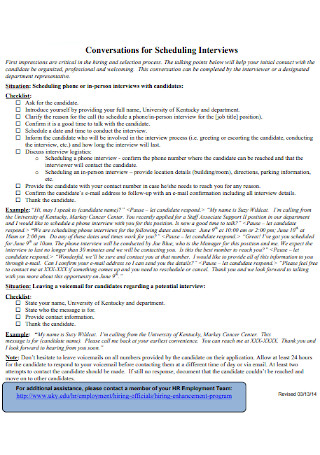
Conversations for Scheduling Interviews
download now -
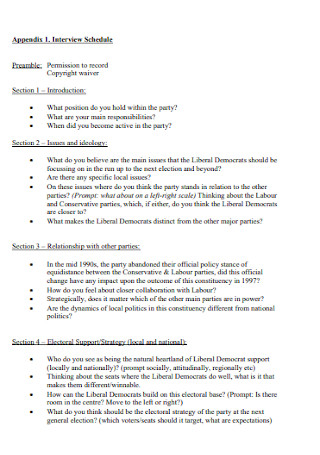
Interview Schedule Format
download now -
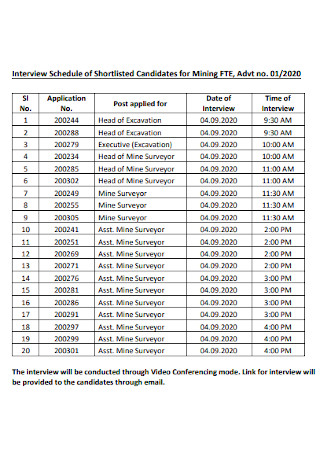
Interview Schedule of Shortlisted Candidates
download now -
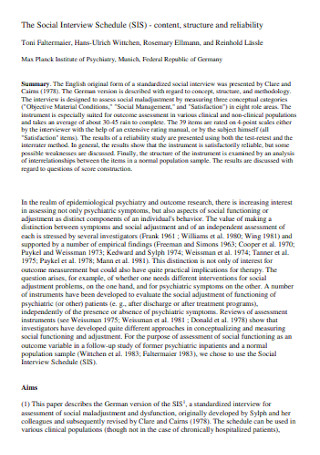
Social Interview Schedule
download now -
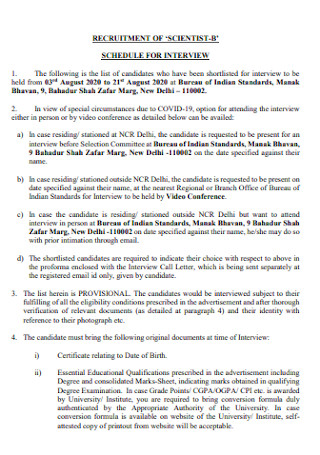
Scientist Interview of Schedule
download now -
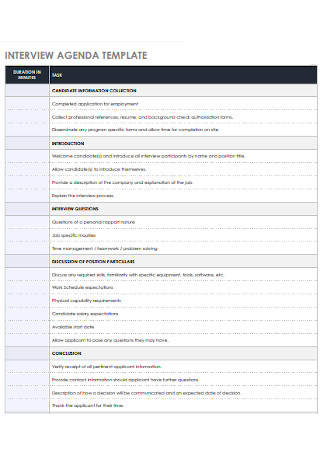
Interview Agenda Schedule Template
download now -
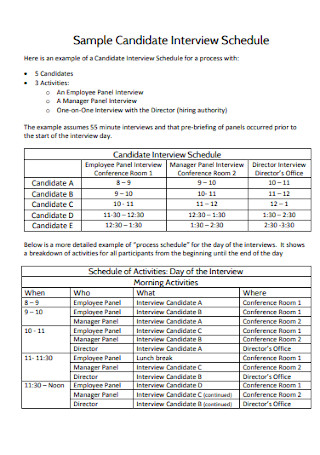
Sample Candidate Interview Schedule
download now -
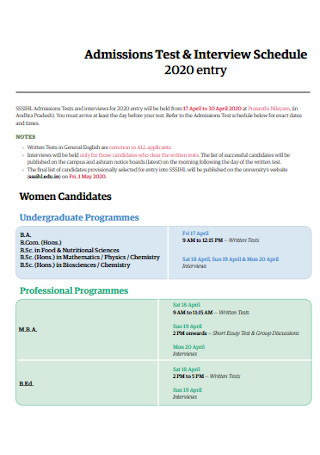
Admissions Test and Interview Schedule
download now -
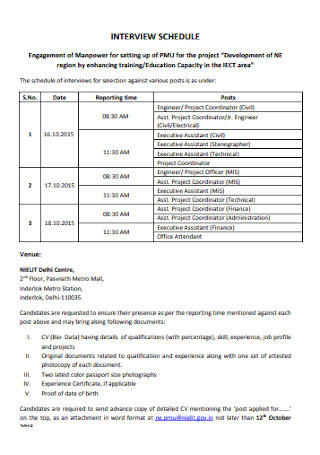
Simple Interview Schedule Template
download now -
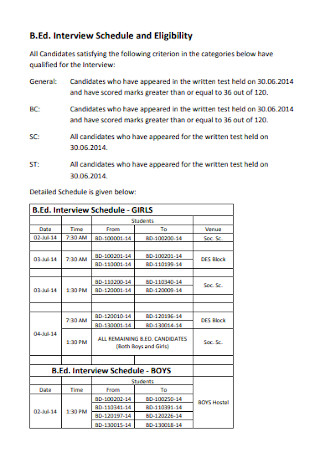
B.Ed. Interview Schedule
download now -
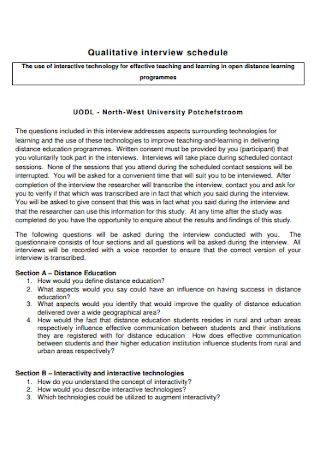
Qualitative Interview Schedule
download now -
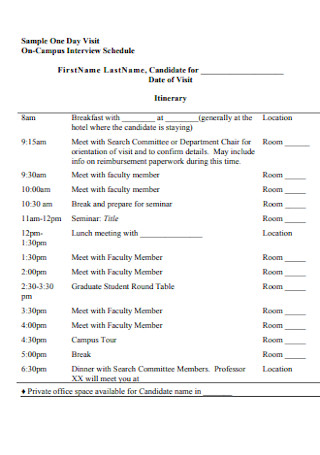
On-Campus Interview Schedule
download now -
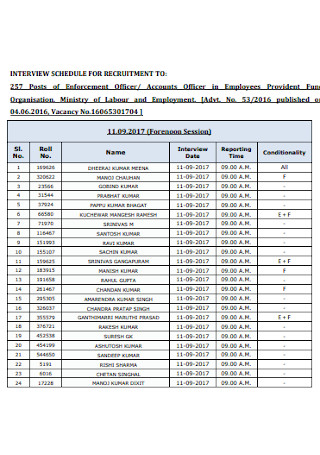
Interview Schedule for Recruitment Template
download now -
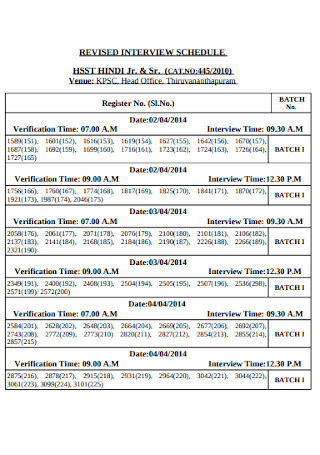
Revised Interview Schedule Template
download now -
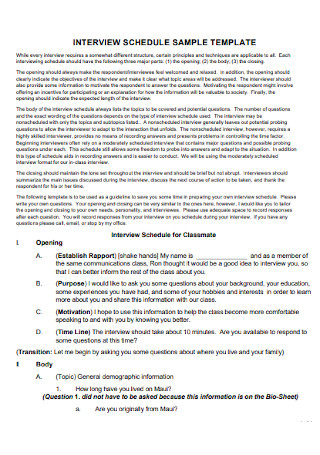
Sample Interview Schedule Template
download now -
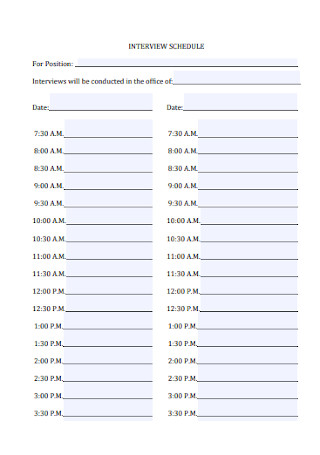
Basic Interview Schedule
download now -
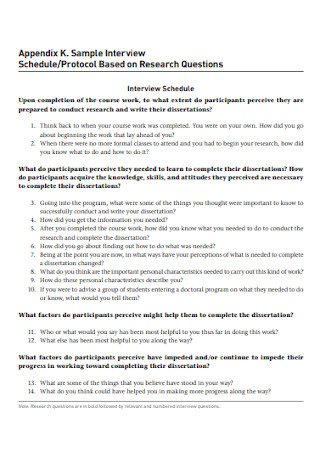
Iinterview Research Schedule Template
download now -
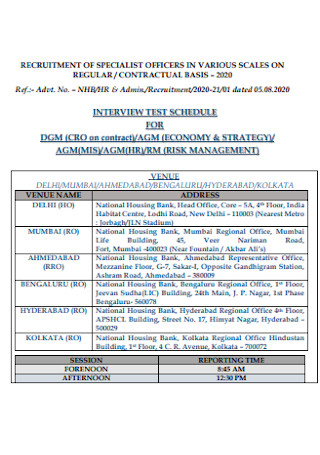
Formal Interview Schedule Template
download now -
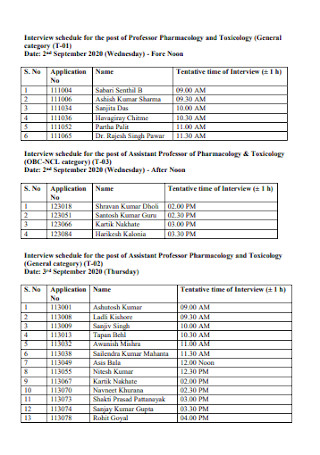
Interview Schedule for Teaching Posts
download now -
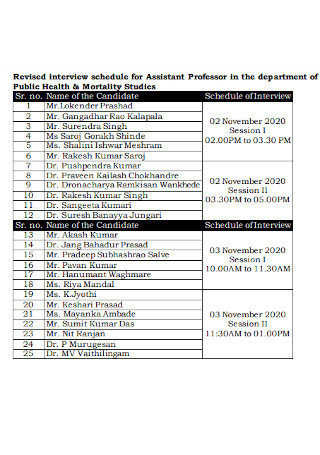
Interview Schedule for Assistant Professor
download now -
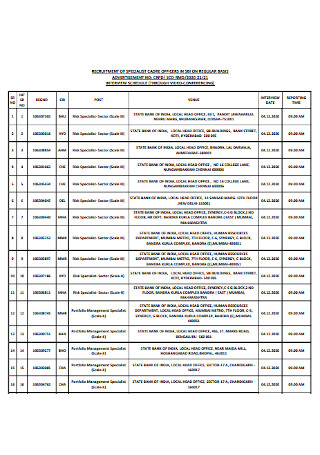
Interview Schedule for Office
download now -
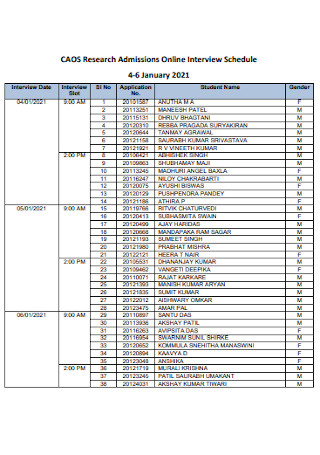
Online Interview Schedule
download now -
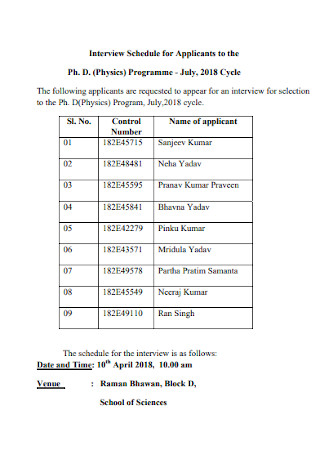
nterview Schedule for Applicants
download now -
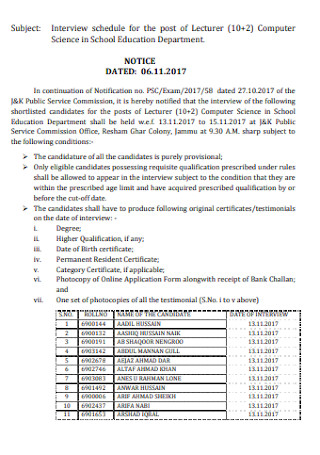
Lecturer Post Interview Schedule
download now -
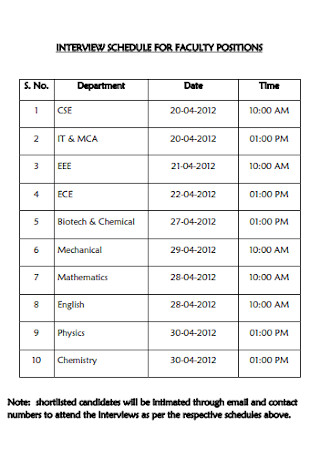
Interview Schedule for Faculty Positions
download now -
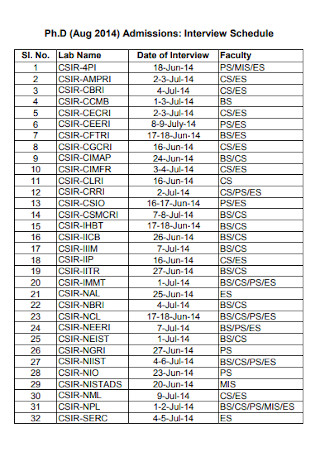
Interview Admissions Schedule
download now -
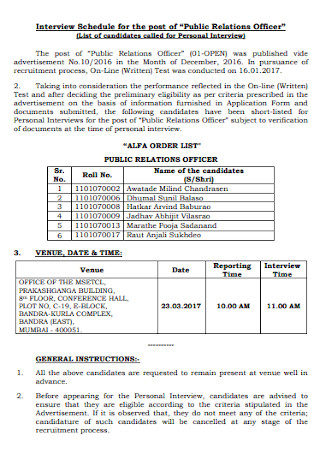
Public Officer Interview Schedule
download now -
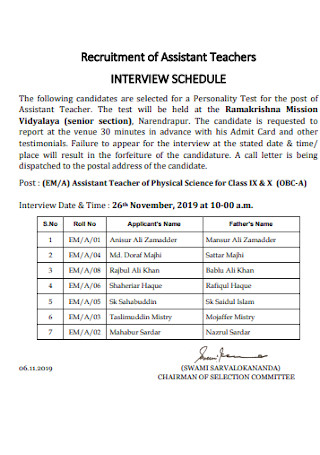
Assistant Teachers Interview Schedule
download now -
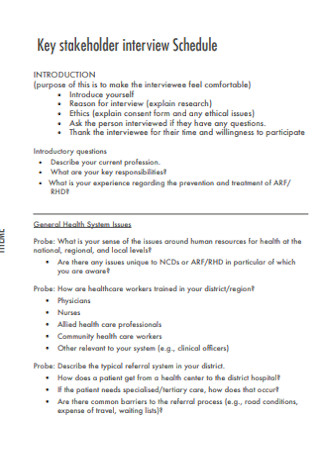
Stakeholder Interview Schedule
download now -
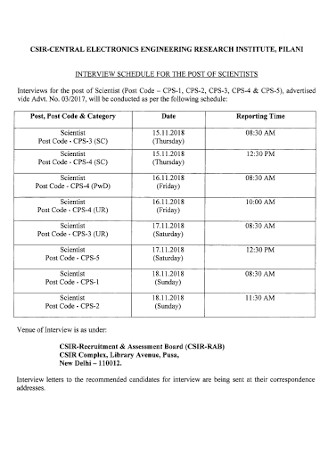
Interview Schedule for Post of Scientist
download now -
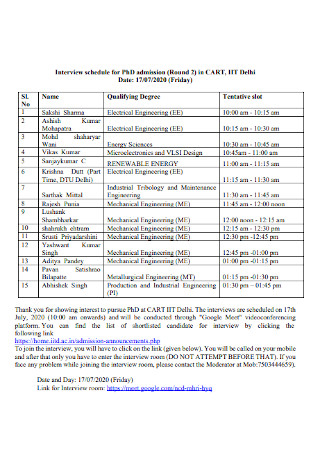
Interview Schedule for PhD Admission
download now -
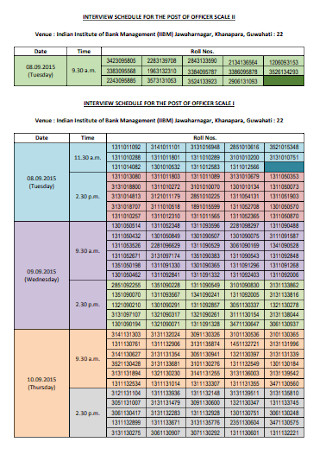
Interview Schedule for Post Officer
download now -
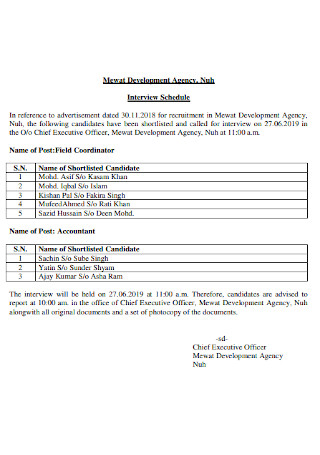
Standard Interview Schedule Template
download now -
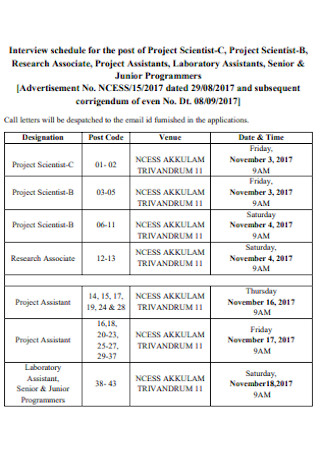
Project Scientist Interview Schedule
download now -
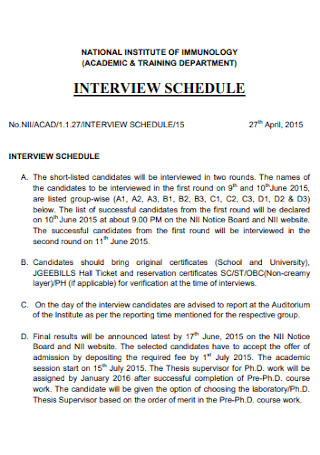
Institute Interview Schedule Template
download now -
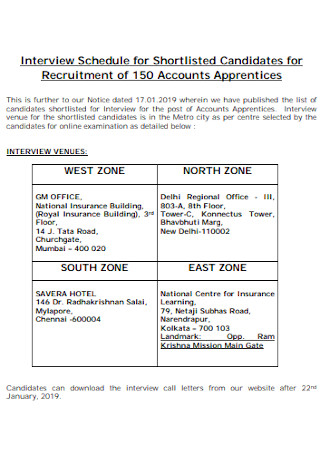
Interview Schedule for Shortlisted Candidates
download now -
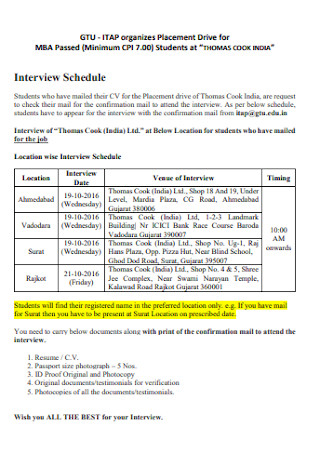
Placement Interview Schedule
download now -
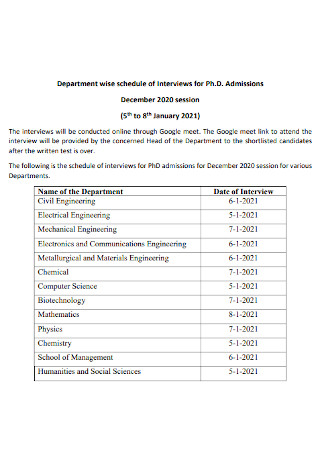
Department Wise Schedule of Interviews
download now -
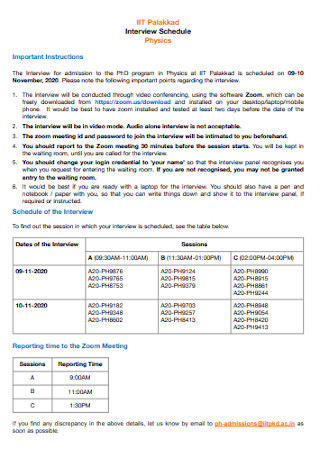
Physics Interview Schedule
download now -
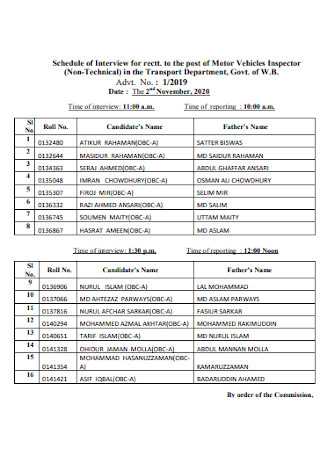
Inspector Schedule of Interview
download now -
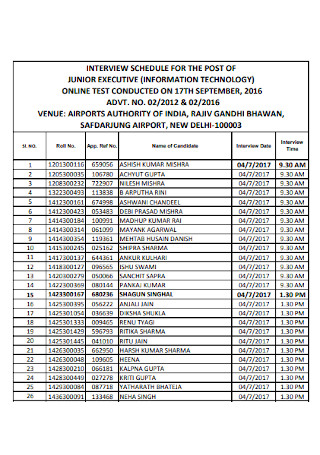
Interview Schedule for Junior Executive
download now -
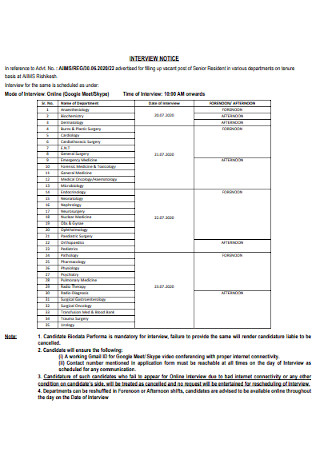
Printable Interview Schedule Template
download now -
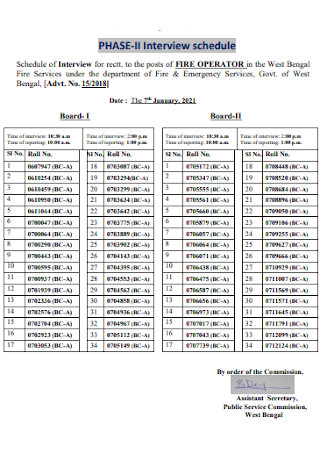
Commission Interview Schedule
download now -
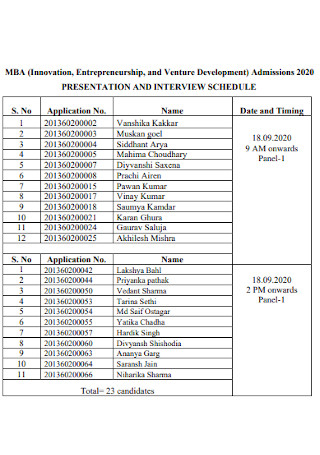
Presentation and Interview Schedule
download now -
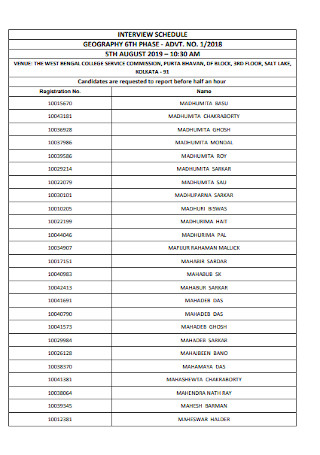
College Interview Schedule Template
download now -
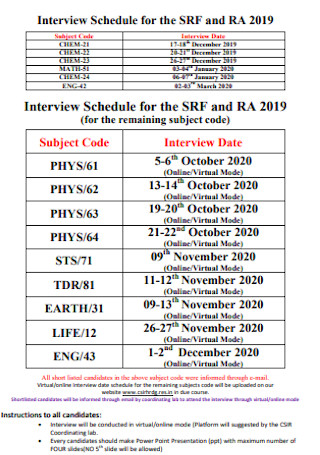
Subject Interview Schedule
download now -
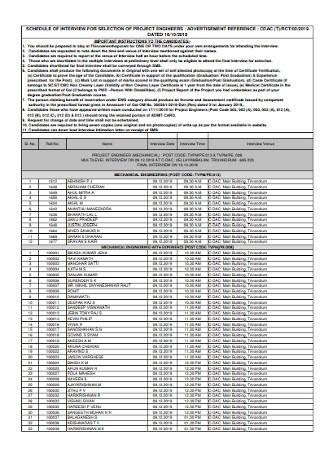
Project Engineers Interview Schedule
download now -
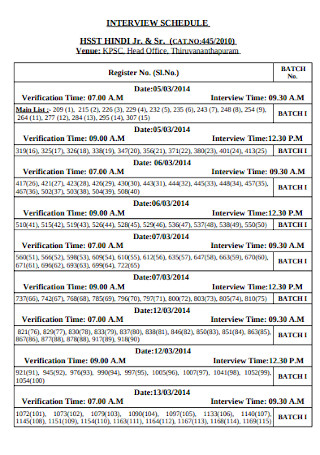
Head Office Interview Schedule
download now -
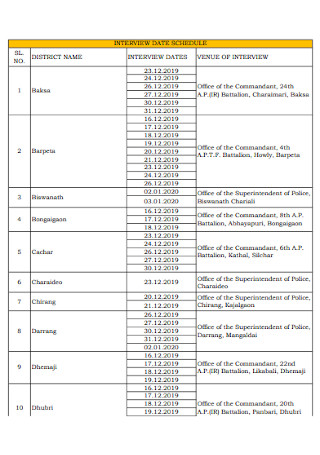
Interview Date Schedule Template
download now -
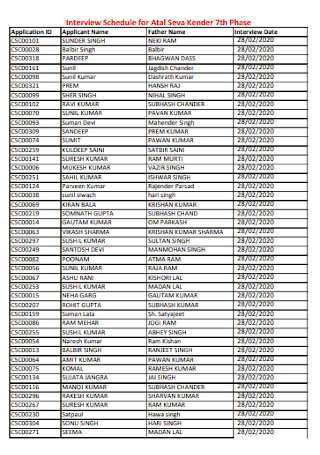
Interview Schedule for Example
download now
FREE Interview Schedule s to Download
50+ Sample Interview Schedule Templates
What Is an Interview Schedule?
Tick Tock: When to Conduct Interviews
The Basic Parts of an Interview Schedule
How to Make an Effective Interview Schedule
FAQs
What are the advantages of an interview schedule?
How many interviews and candidates are there in one job?
What is a panel interview?
What Is an Interview Schedule?
For sure, you already know that an interview consists of an interviewer who asks questions to the interviewee or the one being interviewed. But when it comes to an interview schedule, it is the official document used to guide you on when the interview should happen and what set of questions should be asked in specific periods. Just like an interview questionnaire, a schedule also contains a structured set of questions and is being used by many interviewers to gather data.
According to Glassdoor, every business job opening generally appeals to around 250 resumes.
Meanwhile, the average number of how many candidates would be invited for a personal interview by the hiring manager is only about two to four people.
Why Are Interview Schedules Needed?
You need an interview schedule as a reliable tool in providing successful data collection. Suppose you have a job opening, you could attract up to 250 resumes on average. And how would you handle the job interview of every candidate? You can’t just interview all of them at the same time. There should be a one-on-one session and you should set an appointment according to schedule. Hence, interview schedules exist for that reason; you can now plan the time, place, and complete details per interview.
Furthermore, interview schedules work for many purposes and not just for job interviews. For example, you can set schedules of when to conduct a research interview. Or perhaps, you ask questions related to medical history, adjustment patterns, and other aspects in a clinical interview. And whether you are focusing on qualitative research, psychology, job application, or any other example, what matters most is you know your purpose very well to come up with an effective interview.
Tick Tock: When to Conduct Interviews
Before you delve into creating the interview schedule, do you already know when exactly to conduct interviews? We already reiterated that interviewing applies to different purposes. And it is crucial to familiarize its common functions to know when interview schedules will be needed and used. So in this section, we outlined the examples of when to conduct interviews.
The Basic Parts of an Interview Schedule
Indeed, interview schedules differ in terms of their format, content, design, and features. But there is a standard structure regarding what the schedule contains. And an interview schedule’s three basic parts consist of:
Opening
The initial part of an interviewing schedule kicks off with the opening. And the opening serves as the official introductory statement where you have to welcome the interviewee for coming and thank him or her for being willing enough to answer some questions. In short, greet your guest and make the interviewee feel welcomed or relaxed. Serve the introduction by stating your name and remind the interviewee about the interview’s objectives. Also, you can warn ahead about how long the interview may take.
Body
The meat of the interview would be the body. This section already covers all the questions to ask and what topics to cover. Be sure you have a checklist or questionnaire about the questions to cover in the interview. Besides following the agenda or the structured set of questions, you can also incorporate probing questions or insert extra details to keep the flow going. And what matters is that the questions given in the body would really let you gather all the important data. Otherwise, ending the interview would mean you did not accomplish anything.
Closing
Finally, make a closing statement. This part slowly ends the interview. And to do that, outline and summarize everything covered and what you have learned from the answers given by the interviewees. Be sure to end the talk on good terms and focus more on what the next action is. For example, you tell the interviewee to wait for the next call whether he or she receives confirmation to be a full-time employee or not. And lastly, thank the person for spending the time and cooperating in answering questions truthfully.
How to Make an Effective Interview Schedule
You already learned an interview schedule’s meaning, importance, elements, and more. But the most important takeaway is to learn how to create the interview schedule itself. Never fret because the process is simple. You simply have to observe five easy steps. And they consist of the following:
Step 1: Understand the Interview’s Purpose
First things first, what is the interview for? You have to be reminded about the interview’s main purpose because it helps you know how to tailor the schedule’s content. Suppose you create an interview schedule for a patient. Hence, you will know to only ask relevant questions needed to inquire about their health. The point is you won’t lose track of what to ask or what to do by being clear about what your interview is for in the first place.
Step 2: Look for a Sample Template
Now that you are clear with the purpose, search for a sample interview schedule from our list of templates above. There are many options to choose from that would fit your purpose. And you need not adjust to the given templates because you are free to edit them. Edit the format whether you prefer a version in PDF or MS Word. You can even just fill in the missing details because you no longer start from scratch. Just complete the necessary details until you are through.
Step 3: Outline the List of Questions
You already know that the body should have a list of questions to ask for the interview. Hence, transfer all the questions to the template and arrange them. You can organize the questions into categories by dividing them according to their common elements. You should also know what questions must be asked first until last to create a sequence. And if you are planning a structured interview schedule, then you would know that arrange the questions in the right order is crucial.
Step 4: Associate Time in Your Interview
What makes interview schedules different from interview questionnaires and checklists are how the schedules are associated with time. Thus, write in the schedule about what specific day, month, and year an interviewee should be interviewed. The same goes for the specific time involved; note the hours and minutes. And make sure interviewees would not be interviewed at the same time unless it is a group interview. Conflicts in the schedule would happen if you fail to manage time wisely.
Step 5: Keep an Easy and Organized Interview Schedule
An easy-to-use schedule is the best tool you can work with for interviews. Thus, keep your interview schedule easy and organized as much as possible. As someone who uses the schedule, be sure it works according to your preference. That explains why it would be better to make the schedule yourself rather than make it for someone else because your preference will not always be preferred by whom you may give it to. And once you are happy with the results, produce the schedule.
FAQs
What are the advantages of an interview schedule?
An interview schedule promises you the following advantages:
- A flexible interview and experience
- Clarity of questions
- Saves time and effort in gathering data
- Editable features
- Easy reference
How many interviews and candidates are there in one job?
According to Career Sidekick, an employer usually interviews around six to ten candidates for a job. And such candidates would experience around two to three rounds of interviews before getting the offer.
What is a panel interview?
A panel interview happens when the conducted interview involves around three or more interviewers, as you often see in talent show judging and thesis oral defense.
To experience a smooth flow, save time, and gather loads of information conveniently are just some of the benefits you can expect from interview schedules. How much more when you have a user-friendly and customizable template to boot? Check out our collection of sample interview schedule templates and other examples for the best experience. Download now!
